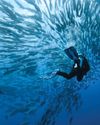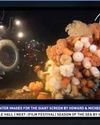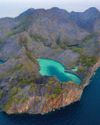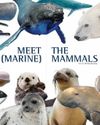يحاول ذهب - حر
Gender Benders
Issue 03 - 2016
|Asian Diver
Sex is a strangely shifting phenomenon in the oceans, and this gender bending is more common than you might ever have realised!.

IN 2003, a surprise event transformed our perception of life in the ocean. This transformation came rather unexpectedly from a heart-warming animated children’s movie, called Finding Nemo. The story of a widowed clownfish’s search for his abducted son, Nemo, changed the general understanding of the ocean as a vast monotonous blue, to a colourful world where Nature’s imagination seems to have run wild. The surprising level of scientific detail in the film taught a generation a lesson in marine biology and conservation, with every laugh and tear.
However, the makers of the film could only go so far in accurately depicting the life-history of its protagonists (the clownfish family) without severely convoluting the plot. Clownfish, like several other fish families, are “hermaphrodites”, which means that they can and will manipulate their sexuality at least once in their lifetime. How would the audience have responded if they knew that in reality Nemo would have been born, not as a male, but in fact, genderless? “He” would eventually have transformed into a male, once his father had turned female following Nemo’s mother’s death.
SHIFTING SEXUALITY
Can we imagine a world where our gender and sexuality is almost guaranteed to change during the course of our lives? Where sexuality is determined, less by our genes at the time of conception, and more by the number of men and women living in our peer group? To think that an individual could change from one sex to another after attaining maturity or to take the place of a lost member of its society, seems absolutely bizarre. Yet this is the norm in the world of fish (and some other marine invertebrates). An adaptation that has evolved independently at different points in fish ancestry, sex change offers its adopters a strong reproductive advantage.
هذه القصة من طبعة Issue 03 - 2016 من Asian Diver.
اشترك في Magzter GOLD للوصول إلى آلاف القصص المتميزة المنسقة، وأكثر من 9000 مجلة وصحيفة.
هل أنت مشترك بالفعل؟ تسجيل الدخول
المزيد من القصص من Asian Diver

Asian Diver
The Sea Specialist: An Interview With Bret Gilliam
Most people learn to crawl before they walk, but there is a man who learned to swim before taking his first steps. Diver, entrepreneur, writer, athlete, maritime specialist – Bret Gilliam is the complete package. Just add water.
13 mins
Issue 04 - 2020

Asian Diver
The Best Of Diving In Southeast Asia: Explore The Amazon Of The Seas
Southeast Asia encompasses the world’s most biodiverse reefs and some of the best diving anywhere on the planet. From the tiniest and rarest critters to huge fish schools and the biggest pelagics, the region has it all, and there’s something to suit divers of any level.
18 mins
Issue 04 - 2020

Asian Diver
Below With David Doubilet & Jennifer Hayes
Best known for their work with National Geographic, David Doubilet and Jennifer Hayes came together to discuss their work with the youth, and, as Jennifer put it, “submerging with the emerging talent”.
1 mins
Issue 04 - 2020

Asian Diver
Underwater Images For The Giant Screen
Howard and Michele Hall are best known for their success in underwater IMAX filmmaking.
1 mins
Issue 04 - 2020

Asian Diver
Journey To Filming For National Geographic Wild Brazil
Cristian is an acclaimed and highly versatile Brazilian wildlife filmmaker who works both underwater and topside.
1 mins
Issue 04 - 2020

Asian Diver
Breaking The Barrier: The World's Deepest Dive
David Strike shared a brilliant presentation about the history of deep diving and how Lt. George Wookey achieved the world’s deepest dive in 1956 using a surface-supplied rebreather.
1 mins
Issue 04 - 2020

Asian Diver
Dive the Golden Land
The Best of Diving In Southeast Asia
4 mins
Issue 04 - 2020

Asian Diver
OFFICIAL LAUNCH OF BLUE HOPE
Top Session of the Week (14,319 (Views) / 42,831 (Reach)
1 mins
Issue 04 - 2020

Asian Diver
MEET THE (MARINE) MAMMALS
MEET THE (MARINE) MAMMALS
5 mins
Issue 04 - 2020

Asian Diver
Fashion Faux Pas
What can be done to mitigate the impact of the garment industry on our oceans?
7 mins
Issue 02 - 2020
Translate
Change font size
